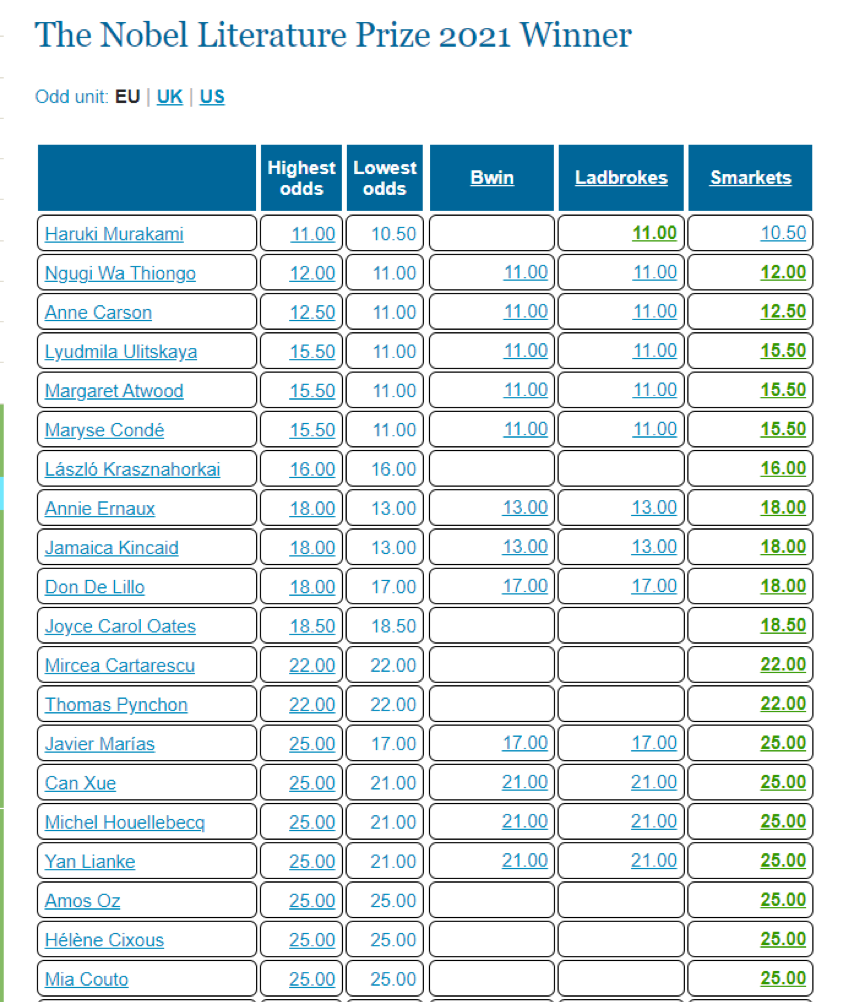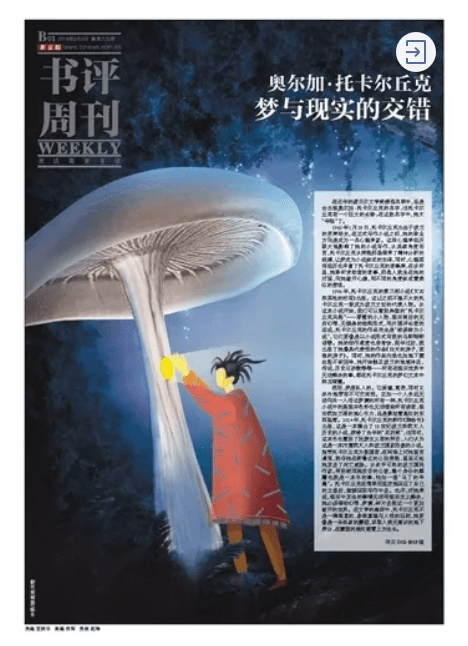In early October, various odds sites also gave the odds list of the winner of the 2021 Nobel Prize in Literature, and we also did a comb to guess which writer the Nobel Prize will be awarded to this year.

As of press time, the top of the NICER ODDS combined odds list continues to be those old familiar (but since they haven't won for so many years there's not much hope for this year) faces. These include Haruki Murakami, Ngugi Thiango, Margaret Atwood, Anne Carson and many more.
The biggest change from the past few years is that everyone seems to know that Milan Kundera can't really win the Nobel Prize. This time his odds are in the bottom five of the list, not even as good as Elena Ferrante and J.K. Rowling.
The reason why Haruki Murakami did not win the Nobel Prize should be clear to everyone, and we have previously posted the Nobel Prize judges' prose book summary, which gave Haruki Murakami a severe despise. Although Haruki Murakami is a very good writer, but many of his novels on the dissipation of the major themes and late some patterned narrative will make him in the Nobel Prize judges' reputation is greatly reduced.
Anne Carson and Atwood, it is also clear why it is difficult to win the Nobel Prize this year. Louise Greco already won once last year as a North American poet, so it should not be given to a poet again this year, and it will not be given to a North American writer. The same is true of Don DeLillo and Thomas Pynchon. Moreover, the post-modern writing of American writers is not very well received by the Nobel Prize judges.
So, what are the features of this year's Nobel Prize in Literature? And which writer is likely to take the crown?
Is the realism of writing increasingly valued?
With that out of the way, let's look at the other popular authors on the list and the Nobel Prize's focus on realism.
There is actually a slight misunderstanding about the Nobel Prize's focus on the realism of writing.
Because Haruki Murakami and Adonis basically have no chance of winning the Nobel Prize in this life, one would think that this is because the themes written in their works are not deep enough and lack the realism of writing. Or, like Atwood, the work is realistic, but now it seems that this realism is not controversial, too starkly correct, too much discussion. It is then easy to turn one's attention to writers with strong, controversial views, especially those from countries that are easily overlooked.

These will certainly be an important factor, but not decisive.
The Nobel Prize for Literature has the influence of realistic topics, but looking back at the Nobel Prize winners over the years, you would be hard pressed to find anyone who won the prize solely on the basis of the realistic subject matter of their writing, or solely on the basis of their focus on grand issues, and in doing so overriding the quality of their work.

The most controversial of the winners in recent years was the Austrian writer Peter Handke, which directly caused a group of international writers to boycott and protest, and Croatia and Serbia continued to quarrel over the pen, in contrast to the reputation of Olga Tokarczuk, who won the prize together.
Peter Handke's book is naturally very much a work that challenges conceptual boundaries, and his travelogue of the region of the former Yugoslavia leads to a viewpoint that is diametrically opposed to the dominant European view. This position led to his being criticized as a remnant of the Hitler era. However, there are no shortage of writers with strong, challenging views, and if one goes to Handke's novels, one will see that he definitely did not win the Nobel Prize solely on the basis of the factor of realism and topicality. The tone of Handke's narrative, the way he organizes the narrative, and his process of combining argument with the psychology of the characters and the slow movement of the observation point of view are very distinctive linguistic features, basically open a book, read a couple of pages, you can know from the tone of the writing is written by Handke.


In addition, the Nobel Prize in the selection of controversial writers, in fact, has been the result of moderate treatment. Otherwise, according to the reality, the issue and the quality of the text, then, Saman Rashidi should have already got the Nobel Prize. There is also an Israeli writer A.B. Yehoshua who did not enter the list, his novel in the writing of the realistic tendency is also very obvious, and the narrative is not bad. But compared to him, the Nobel Prize judges should prefer the gentle point of view and fraternal feelings of Amos Oz, whose name can still be seen on the list of Nobel Prize odds three years after Oz's death. If it is to be a compensation for that generation of Israeli writers - David Grossman is also a candidate to be considered.
Emerging and disappearing authors on the odds list
So, there are some writers who have risen to the top of the odds list in the last two years, but I don't think they have a good enough chance of winning the Nobel Prize for literature this year - and in the next few years. For example, the Kenyan writer Ngugi wa Thiango, Guadeloupe writer Maris Condé and so on. Condé's books are not available in translation in China, but a quick look at her work reveals that her writing is mainly autobiographical and focuses on the social conflicts between Africans and the local diaspora in the Caribbean. Tiago's novels have been translated in China, and he has a strong experience in political and cultural conflicts, but if we do not look at the theme, the way of writing narrative and previous years of the Nobel Prize writers, is really a bit dull.
-1024x597.png)
Another author who appeared on the list last year and whose odds have climbed this year is Jamaica Kincaid from Antigua and Barbuda. Her books are also not available in domestic translation, but one comment by Harold Bloom about Kincaid's work can be found - "Most published criticism of Jamaica Kincaid emphasizes her political and social concerns, but to some extent at the expense of her literary qualities ". Walcott and Sontag have also commented on Kincaid's work, arguing that her books do not go beyond superficial magical realism, but complete autobiographically sincere narratives by virtue of sentences that point to their own contradictions. Compared to other list favorites, Kincaid seems to be something to keep an eye on.
In the European region, Albanian writer Ismail Kadale's work balances political reality and literary form, but given his somewhat debatable personal history, the Nobel Prize judges should not risk awarding the prize to this writer until this point is clarified.
In addition to these writers who have climbed up the list over the past two years, there are also writers who were once highly ranked but have recently slipped and disappeared. These include Spanish writer Javier Marías (not gone, but plummeting in the rankings), Norwegian playwright Jørn Fosse (plummeting in the rankings), Italian writer Claudio Magris (completely gone), Syrian poet Adonis (completely gone), and Irish writer John Banville (completely gone). And then there is Milan Kundera, mentioned at the beginning of the article.

This change may be indicative of a reading trend. It is clear that as the number of new books published decreases and readers' interests shift, these authors are no longer the hot topics they once were, and with the rise of topics about race, post-colonialism, religious conflict, technological society and feminism in recent years, some authors who have clearly been famous for many years but were previously unheard of are beginning to appear on readers' radar through the list.
So, many of the top ranked writers in the list, really just look at it.
Predicting the four possible winners
So much for the details, and finally give a little prediction of this year's Nobel Prize.
Excluding North America, this year's Nobel Prize winners should come from Africa, West Asia and Europe. As for Latin America, their literary boom seems to have passed, although the Bolaños are still distinctly alive in the hearts of readers.
Africa region as far as one's own reading accumulation is concerned, Mozambican author Mia Kotto might be a good choice for his unique narrative style, which has a dreamy and magical quality, while also exploring many themes related to ethnic and colonial history.

In Europe, the possible candidates are the Russian writer Lyudmila Ulitskaya and the Hungarian writer Krasnohorkaj Laszlo. Ulitskaya's novels are very characteristic of the traditional Russian literary style, while Krasnohorkaj's novels have a deeper atmosphere, using poetic language to depict desperate life dilemmas.
In the Middle East of West Asia, given the many events of the recent past and the past few years, and the fact that Amos Oz is still on the odds list, it is not clear what the judges have in mind, but at least it shows that the conflict in the Middle East is still a subject of interest to international readers. Then, Israeli author David Grossman, who does not appear in the odds list, may also win. The reason why another writer who appeared in the list, Yehoshua, was not chosen is because the Zionist ideas in his novel are too clear and radical. Grossman, who has previously won the Booker Prize and has experienced the loss of a loved one due to war in the Middle East, is more likely to contribute to a compassionate understanding of the current situation in the Middle East.





